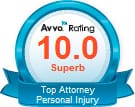The back is one of the most vulnerable parts of the body. Despite being flexible, the long, winding human spine, along with the many muscles, ligaments and tends associated with it, are easy to move out of place or otherwise injury, especially when a person does heavy lifting or other vigorous manual work.
One common back injury is a herniated disk, which is a problem that affects many Floridians of all ages.
The spine is made up of a series of small, roundish pieces of bone called vertebrae. Between each pair of bones is a disk with relatively soft matter inside of it. The disk serves as a cushion to prevent bones rubbing on other bones. They work much like brake pads or other mechanical equipment designed to prevent metal rubbing on metal.
When one of these disks tears on the outside, however, the softer material tends to escape, which can in turn put pressure on nearby nerves. This can create pain that can radiate throughout the body and be severe, even debilitating. This condition is what doctors would diagnose as a herniated disk.
In some cases, a person will experience weakness or tingling sensation as the injured disk pushes on that person’s nerves. In the most severe cases, a person may struggle with continence or might experience a complete loss of sensation around the midsection.
Although diet, exercise and good posture can help prevent a herniated disk, the reality is that in many cases, a person develops one because of genetics or simply because of the wear and tear they put on their back, usually while they are working to support their families.
If a herniated disk leaves a person unable to work even after surgery, then Social Security disability benefits might be available.







